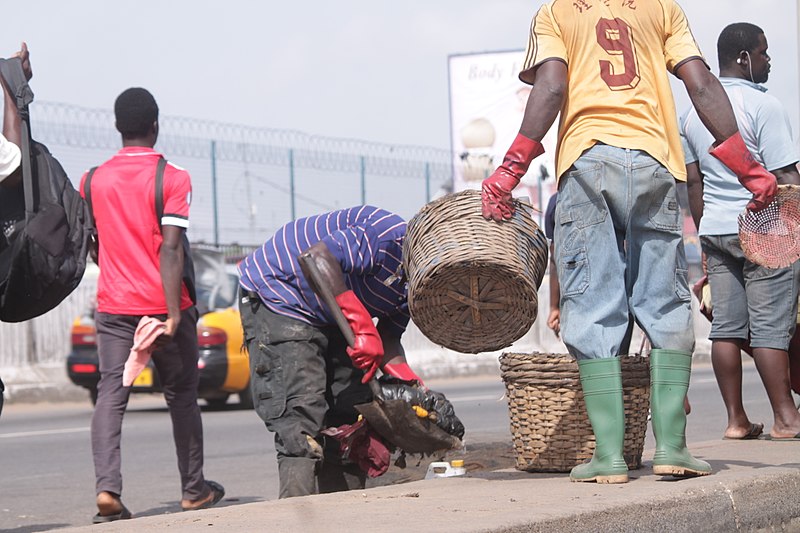8 Facts About Sanitation in Ghana
 Ghana is one of the most urbanized countries in Africa and has an increasing population of 29 million people. Despite its urbanization effort, there is still a lack of access to basic sanitation services in many areas. A significant portion of the people in Kumasi depend on public restroom facilities, and in low-income areas, there is little to no access to water. This is a large drawback of Ghana’s rapid urbanization. Here are eight facts about sanitation in Ghana.
Ghana is one of the most urbanized countries in Africa and has an increasing population of 29 million people. Despite its urbanization effort, there is still a lack of access to basic sanitation services in many areas. A significant portion of the people in Kumasi depend on public restroom facilities, and in low-income areas, there is little to no access to water. This is a large drawback of Ghana’s rapid urbanization. Here are eight facts about sanitation in Ghana.
8 Facts About Sanitation in Ghana
- WSUP Water Utilities: The Water and Sanitation for the Urban Poor (WSUP) has been working with the Ghana Water Company to help advise and facilitate ways to provide water to low-income districts. WSUP has encouraged local communities to contribute to the success of the service so that the result ends in proper water access to the residents. WSUP’s initiative attempts to close the gap between poor water and sanitation access and the socio-economic development and political position of women. The support of WSUP has resulted in more than 100,000 residents in low-income communities gaining access to water services.
- Clean Team: A project called “Clean Team” was set up by WSUP in Ghana in 2012, and works using container-based toilet systems. Residents who use Clean Team are charged a low monthly fee to access the system. Clean Team won USAID’s Digital Innovation Award in 2017 following the success of this program. WSUP was able to achieve this win after partnering with MTN to allow customers to use mobile banking to pay their fees instead of cash.
- UNICEF Rural and Urban Sanitation: Ghana’s open defecation rate was reported at 18.06 percent in 2017. UNICEF has been encouraging and promoting behavior changes through the Rural Sanitation Model and Strategy in Ghana to tackle this problem. The main aim is ending open defecation and advocating for the construction of household waste facilities. UNICEF has also partnered with charities that provide loans to help community members build toilets and practice cleaner and safer habits. At the end of 2018, UNICEF launched the Basic Sanitation Fund together with Apex Bank, the Ministry of Sanitation and Water Resources and the Embassy of the Netherlands. The loan program is targeted at developing more products to improve sanitation conditions in households.
- Water.org WaterCredit: Water.org has partnered with three Ghanaian micro-finance institutions for its WaterCredit program. So far it has succeeded in reaching more than 380,000 people and provided more than $2.4 million in loans. The program is aimed at providing communities with credit to invest in the construction of wells, latrines and rainwater harvesting equipment, all in an effort to reduce the cost and restrictions of clean water.
- School Toilet Blocks: More than 7,000 public schools in Ghana are without basic toilet facilities. WSUP is working with the Ghanaian Ministry of Education to provide schools in Accra and Kumasi with toilet facilities for children specifically, as well as hand washing blocks extensively available for both students and teachers. Of note, the Kumasi Metropolitan Assembly (KMA) has received support from WSUP and managed to provide toilet facilities in seven schools. The KMA hopes that this initiative acts as a model for other schools to improve their sanitation positions.
- Urban Sanitation Research Initiative Ghana: This initiative is a 2017 to 2020 program aimed at extensive research work around sanitation in three countries including Ghana. Led by WSUP, the program’s goal is to encourage sector changes surrounding sanitation and gather evidence that will allow the country to receive aid and funding to improve its conditions. The research exercises are only the first but very vital step in achieving success to improve Ghana’s sanitation plight.
- Sanitation Surcharges: Effective January 2017, a sanitation surcharge was introduced in Ga West Municipal Assembly. WSUP supported this innovation to be included with property tax in an effort to remove any heavy dependence Ghana has on donor funds to help solve its sanitation problem. The surcharge policy has been successful in that the revenue generated at the end of 2018 was over 30,000 GHS. Several similar approaches are being conceived in the country with the same aim.
- Health Rank: In 2015, Ghana was ranked the seventh dirtiest country by sanitation standards by the WHO with over 7,000 children dying every year from conditions such as cholera and diarrhea. Today WSUP has managed to extend hygiene training to over 2 million people. These types of approaches are ongoing to battle the links between poor sanitation and poor health.
These eight facts about sanitation in Ghana show that the country remains in disparity while experiencing progress. With the help of global institutions and non-governmental organizations, the country can be set in a position to experience a safe and sanitary future.
– Regina-Lee Dowden
Photo: Wikimedia Commons
